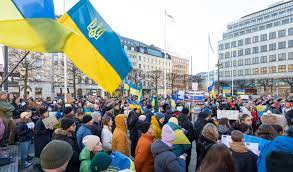Ukraine-Russia crisis displaces millions, affects global economy

This image was accessed via Google Images under the Creative Commons License.
Protesters across the world speak out against the Russian invasion of Ukraine as relief aid groups seek donations to support the refugee crisis emerging from the conflict.
In the early hours of February 24, 2022, citizens across Ukraine were awoken in one of the most terrifying ways imaginable; in the largest movement of armed forces since the Second World War, Russia had launched an invasion of Ukraine in an escalation of a decades-long conflict. The world watched on edge as the crisis developed into a full-scale war and Ukrainians began to emigrate in mass numbers as their cities turned into battlefields.
The tensions between Ukraine and Russia are not new. Following the collapse of the Soviet Union in the early 1990s, a newly-liberated Ukraine was left with one of the largest nuclear reserves in the world, much to the chagrin of Russian government. However, in the 1994 Budapest Memorandum, Ukraine agreed to trade away its stockpile to Russia for guarantees from Russia, the U.S. and the U.K. to respect its sovereignty.
With Russia at least somewhat appeased, Ukraine emerged as a capitalist society with a growing market economy over the next decade. But a politically-fraught presidential election in 2004 instated Victor Yushchenko as the Ukrainian president over the Kremlin-supported Viktor Yanukovych, despite the fact that Yushchenko was suspiciously poisoned towards the end of his campaign and the election was one of the most contested in Ukraine to date.
Regardless, Yanukovych took office as the fourth president of Ukraine in 2010. Fast forward to late 2013 when he refused to sign Ukraine into a free-trade agreement with the European Union resulting in massive protests calling for his resignation. In February of 2014, fighting between protestors and law enforcement left more than 100 dead and caused Yanukovych to flee to Russia. An emergency government was installed in the country which prompted Russia to declare that Ukraine was in an illegal coup. Shortly thereafter, Russian troops appeared in the Crimean peninsula of Ukraine. The Crimean parliament then voted in favor of secession and in March, Russia completed its annexation of Crimea.
While the annexation wasn’t recognized by most European countries, Russia-backed separatists in the Donbas region broke into government buildings with declarations of secession in April of 2014, marking the start of a violent conflict that is still ongoing.
Since the Donbas violence began, several different negotiations for ceasefire have proved unsuccessful, and more than 14,000 people have been killed. The conflict heightened in spring 2021 when Russian troops appeared to move in on the Ukrainian border. By the start of 2022, the troops had remained and world leaders began to call on Russia to pull out. However, the ever-present violence in the Donbas region escalated, and on February 24, Russia entered into a major invasion of Ukraine.
In the days since, the assault has proved devastating to much of Ukraine. At the time of writing, an estimated 2.8 million Ukrainians have fled the country and an unknown number of casualties have been killed or wounded.
However, since Ukraine is not a part of NATO, member-nations of that organization are somewhat limited in the amount of support they can provide (that is, they can’t outright supply troops or direct intervention into the conflict without risking Russian backlash of their own). As of now, most relief has come through humanitarian aid and supply of military equipment.
Be it through building materials or supplying food and other necessities, Social Studies teacher Mr. Schwab posited that financial support like this is probably the best way to aid Ukraine short of actually sending troops.
Senior Even Berry felt similarly: “Boycotting everything that’s Russian is not a logical approach. But sending money to humanitarian groups helps the population. Donating time is hard to do a continent away, but donating money is very helpful.”
TASD has taken this particular effort to heart. With the launch of the new nonprofit Operation Sunflower, 100% of funds raised will go to immediate humanitarian relief in Ukraine. Since the project has just launched, more details will be released in the coming days, but check out The Hiller website home page for updates.
In retaliation to Russia’s actions, both the United States and the United Kingdom have placed full bans on Russian gas and oil, the country’s largest exports. Along with these countries, Canada and the E.U. have imposed financial sanctions, such as the freezing of Russia’s international assets or the banning of trade of certain goods, on large-scale institutions such as its central bank.
It is worth noting that although sanctions like these are some of the toughest steps a nation can take aside from physically entering the war, both Schwab and Berry agreed that the likelihood of a global war erupting from the conflict is very low.
Western nations have also targeted wealthy individuals involved with the Kremlin known as “oligarchs.” Coupled with the imposition of financial sanctions, these measures seek to debilitate Russia’s economy through the freezing of its international assets and by cutting off trade.
However, with the weakening of Russia’s economy comes the calculated risk of damages to the global market, which is becoming increasingly evident as the conflict deepens.
“The effect on global economics is anything dealing with oil, which is everything. That’s the major relation [between the global economy and Russia]. You know, BP just gave up a 25 billion dollar stake in a Russian company. Just walked away. That money will have to come from somewhere,” Schwab commented.
The extent of the effects of the war on the global economy will likely remain unknown until the conflict is resolved. Until then, countries face the probability of inflation and product shortages across various industries.
A 21st century war was certainly not something a world exhausted by two years of the coronavirus pandemic had hoped for. But Ukraine has historically proven to be a resilient nation, so the United States and the world will continue to watch with bated breath with the hope of a quick resolution and limited number of casualties. Donations to Ukraine and relief aid efforts can be made through any of the links found on this page
Outside of school, you can usually find Emma dancing, solving word puzzles, buried deep inside a book, or dreaming of some new and delicious dessert to...





